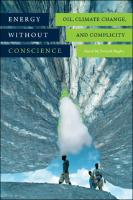Energy without Conscience
Oil, Climate Change, and Complicity
Author(s)
Hughes, David McDermott
Collection
Knowledge Unlatched (KU)Number
100689Language
EnglishAbstract
'In Energy without Conscience' David McDermott Hughes investigates why climate change has yet to be seen as a moral issue. He examines the forces that render the use of fossil fuels ordinary and therefore exempt from ethical evaluation. Hughes centers his analysis on Trinidad and Tobago, which is the world's oldest petro-state, having drilled the first continuously producing oil well in 1866. Marrying historical research with interviews with Trinidadian petroleum scientists, policymakers, technicians, and managers, he draws parallels between Trinidad's eighteenth- and nineteenth-century slave labor energy economy and its contemporary oil industry. Hughes shows how both forms of energy rely upon a complicity that absolves producers and consumers from acknowledging the immoral nature of each. He passionately argues that like slavery, producing oil is a moral choice and that oil is at its most dangerous when it is accepted as an ordinary part of everyday life.
Keywords
History; Climate change (general concept); Hydrocarbon; Petroleum; Port of Spain; Trinidad; Trinidad and TobagoDOI
10.1215/9780822373360ISBN
9780822373360OCN
956775679Publisher
Duke University PressPublisher website
https://www.dukeupress.edu/Publication date and place
Durham NC, 2017Grantor
Classification
History of the Americas


 Download
Download